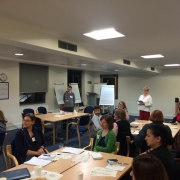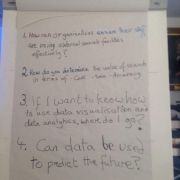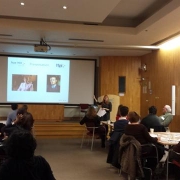November 2015 Seminar: Offshoring/Outsourcing Information Services
Summary
The offshoring and outsourcing of information services are two business models/strategies that have matured significantly in recent years. However, they have a number of challenges that in-house operations do not necessarily face.
Offshoring or Outsourcing your Information function – either, neither or both? Whatever your situation the issues raised by this question are complex and fascinating.
Globalisation and the impact of the internet has changed so many aspects of our lives. In this seminar on 19 November 2015, NetIKX members and guests looked at one important change that is now possible – relocating your information services team to far off places, or even outsourcing your information altogether to another organisation.
Outsourcing and offshoring were not simple alternatives to keeping work in the home office. The companies concerned have both used an evolutionary approach. By using a ‘mix and match’ approach, they have been able to widen the range of options to suit their circumstances. There were serious economies to be made from the best choices.
Much of the work has been focused in India, where a well-educated workforce is available to reduce costs. However, the companies have also continued to have a team in the UK. Motivating staff was not a serious issue as in many ways, the new arrangement can be positive for all concerned. Local staff continue to work on the higher value, more challenging work, while offshoring workers enjoy the opportunities offered by the routine work, as can be seen by the fact that some people have stayed with the company for over nine years.
Standards can be maintained by careful controls. If language is an issue as the workers are second-language English speakers, careful controls can be set up to monitor any problems. One important recommendation was to have a very robust quality control process. In addition, it is advisable to use a checklist to assess the suitability of a work task for offshoring and to ensure that there are no copyright compliance issues when information services tasks are taken offshore.
Speakers
Chrissy Street joined Clifford Chance LLP in 2000 and is now Head of Central Information Resources. Chrissy has several years’ experience of working with offshore teams and transitioning work to a new location. Alongside her responsibility for the London Information budget and a London-based team specialising in subscription and vendor management, Chrissy is the onshore owner of the Knowledge and Information team based in the firm’s Global Shared Service Centre in India. This goes hand in hand with project work, particularly from a Continuous Improvement perspective to make processes and systems more efficient.
Karen Tulett has 20 years in the Information industry and is currently a Director at Morgan Stanley. She is responsible for a group of functions associated with the discovery and processing of information: Business Information services; Publishing Services supporting the document creation requirements of the firm; and Translations Services. These are provided by in-house and outsourced vendors and Karen is part of a global team managing the third party relationships and her direct responsibilities include managing the London-based in-house research team and managing the vendor relationship between Morgan Stanley and their outsourced and offshored publishing partners. Prior to Morgan Stanley, Karen has held various information roles at investment banks, and also managed information teams at an executive recruitment firm and for an outsourced information provider.
Time and Venue
2pm on 19th November 2015, The British Dental Association, 64 Wimpole Street, London W1G 8YS
Pre Event Information
None
Slides
Not currently available
Tweets
Blog
See our blog report: Offshoring/Outsourcing Information Services
Study Suggestions
None




